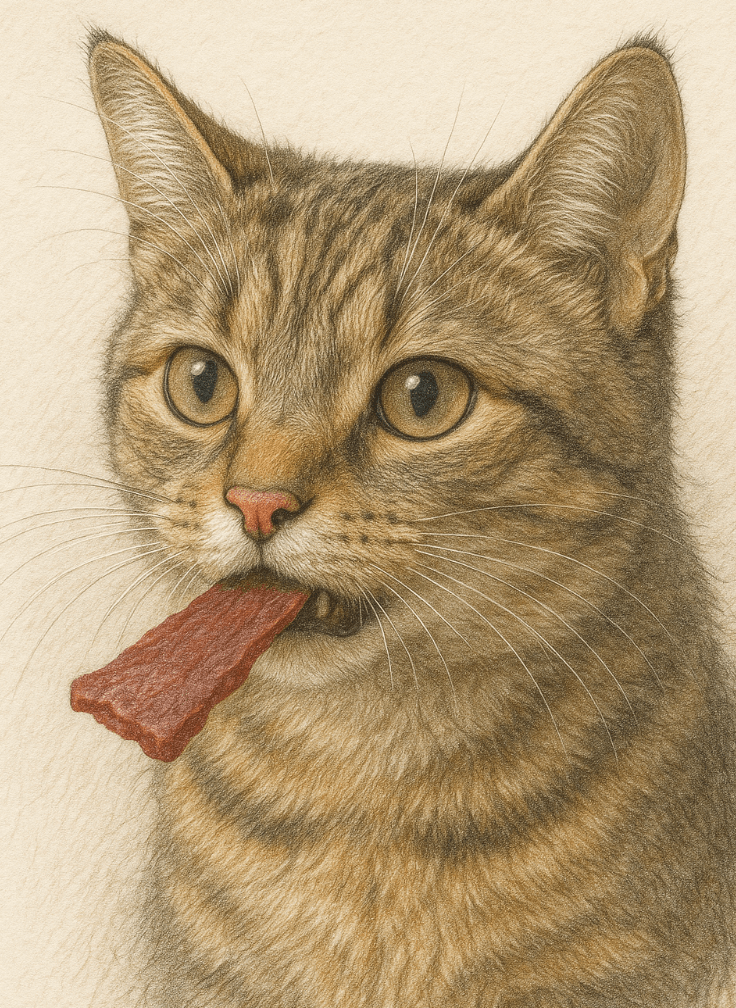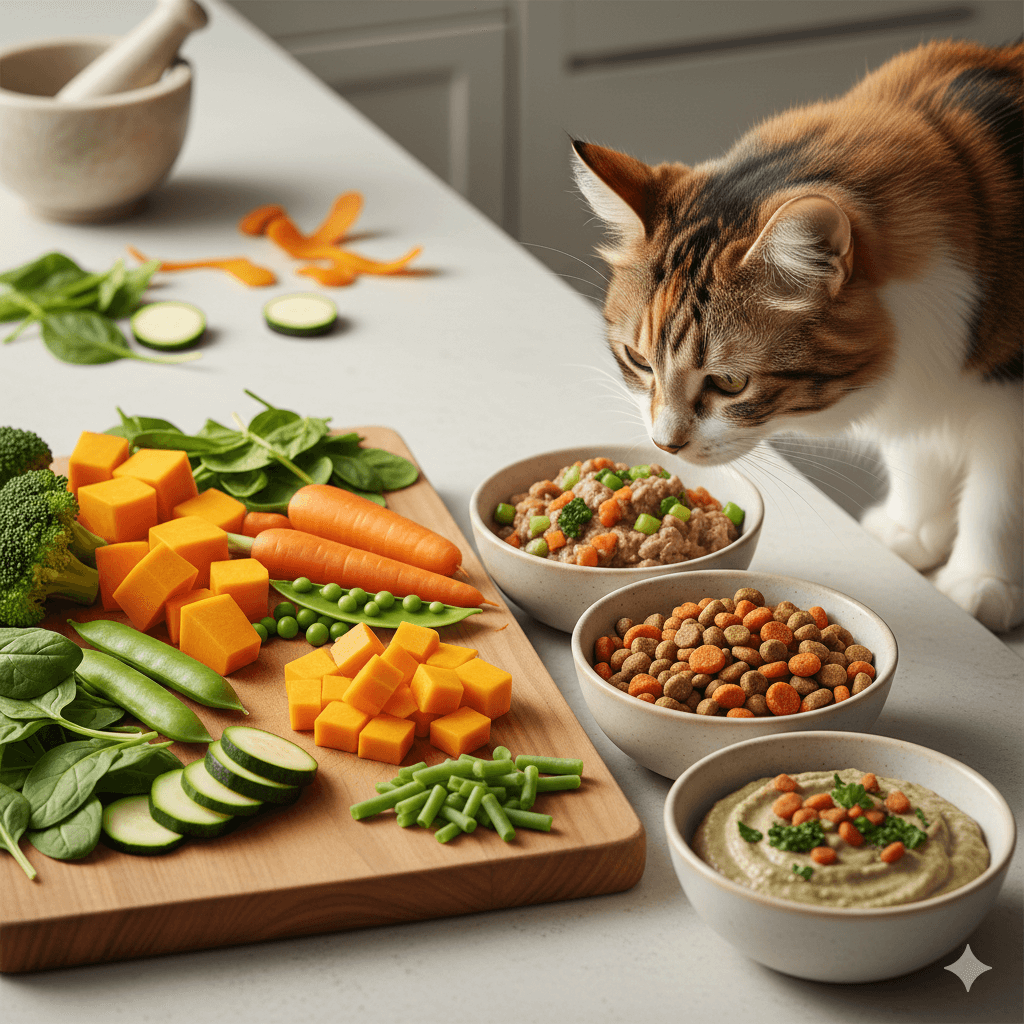Can Cats Eat Beef Jerky?
Beef jerky is a popular snack for humans, known for its savory taste and high protein content. But what about our feline friends? Can cats safely enjoy this chewy treat, or could it pose risks to their health? While cats are obligate carnivores and naturally drawn to meat-based foods, not all human snacks are suitable for them. Understanding the potential benefits and dangers of feeding beef jerky to your cat is essential to ensure their well-being. In this blog post, we’ll explore everything you need to know about cats and beef jerky, from nutritional considerations to safer alternatives.
Potential Risks of Feeding Beef Jerky to Cats
While beef jerky might seem like a tasty treat for your cat, it comes with several risks that every pet owner should be aware of. These hazards can range from minor discomfort to serious health issues.
High Sodium Content:
Most commercial beef jerky contains excessive salt, which can lead to dehydration, kidney strain, or even sodium ion poisoning in cats.Artificial Additives and Preservatives:
Ingredients like nitrates, nitrites, and artificial flavors can irritate your cat’s digestive system or cause long-term health problems.Choking Hazards:
The tough, chewy texture of beef jerky may pose a choking risk, especially for smaller cats or those prone to gulping food.Difficulty Digesting Spices:
Many beef jerky products include spices like garlic or onion powder, which are toxic to cats and can damage their red blood cells.Risk of Obesity:
Beef jerky is calorie-dense, and frequent consumption can contribute to unhealthy weight gain in cats.
These risks highlight why caution is essential when considering giving beef jerky to your cat. Always prioritize their safety over curiosity or convenience.
Benefits of Beef Jerky for Cats (When Prepared Safely)
Despite the risks, plain, minimally processed beef jerky can offer some benefits if prepared and supervised correctly. These advantages are rooted in their natural dietary needs as obligate carnivores.
High Protein Content:
Cats thrive on protein-rich diets, and plain beef jerky can provide a nutrient boost if given in moderation.Natural Energy Source:
Lean beef jerky without additives can serve as an occasional energy-boosting treat for active cats.Mental Stimulation:
Chewing on small, soft pieces of jerky can engage your cat’s natural instincts and provide entertainment.Encourages Hydration Awareness:
Offering jerky as a rare treat can encourage cats to drink more water due to the slightly salty taste.Customizable Treat Option:
Homemade beef jerky allows you to control ingredients, ensuring it’s safe and tailored to your cat’s dietary needs.
While these benefits exist, they must be weighed against the potential dangers to determine if beef jerky is truly suitable for your cat.
Check this guide 👉Can Cats Eat Gelatin? Best 7 Expert Tips!
Check this guide 👉Can Cats Eat Chicken Feet? Best 7 Expert Tips!
Check this guide 👉Can Cats Eat Cotton Candy? Best 7 Expert Tips!

Safe Alternatives to Beef Jerky | Risks of Unsafe Beef Jerky Choices |
|---|---|
Plain cooked chicken strips | Store-bought jerky with high sodium levels |
Freeze-dried meat treats | Jerky containing garlic or onion powder |
Small pieces of boiled beef (unsalted) | Tough jerky that poses choking hazards |
Homemade jerky with no spices or additives | Jerky with artificial preservatives |
Cat-specific meat-based treats | Overfeeding calorie-dense jerky |
How to Safely Offer Beef Jerky to Your Cat
If you decide to give your cat beef jerky, it’s essential to take precautions to minimize risks. Follow these guidelines to ensure a safe experience.
Choose Plain, Low-Sodium Options:
Opt for jerky without added salt, spices, or preservatives to reduce the risk of toxicity or digestive upset.Prepare It Yourself:
Making homemade beef jerky allows you to control the ingredients and avoid harmful additives.Cut into Small Pieces:
Ensure the jerky is cut into bite-sized pieces to prevent choking and make it easier for your cat to eat.Limit Portion Sizes:
Offer only tiny amounts as an occasional treat, ensuring it doesn’t replace balanced meals.Monitor for Reactions:
Watch for signs of digestive distress, such as vomiting or diarrhea, after introducing beef jerky.
By following these steps, you can mitigate risks while allowing your cat to enjoy the occasional beef jerky treat safely.
Signs Your Cat May Be Struggling After Eating Beef Jerky
Even with precautions, complications can arise if your cat consumes beef jerky improperly. Watch for these warning signs to act quickly if something goes wrong.
Vomiting or Diarrhea:
These symptoms may indicate that your cat has ingested harmful additives or eaten too much jerky.Excessive Thirst or Urination:
Increased water intake could signal sodium poisoning caused by high-salt jerky.Lethargy or Weakness:
A sudden lack of energy or difficulty moving might suggest toxicity or dehydration.Loss of Appetite:
If your cat refuses to eat after consuming jerky, it could indicate digestive upset or illness.Pawing at the Mouth:
This behavior often indicates that your cat is experiencing discomfort or irritation from tough jerky.
Recognizing these signs early allows you to seek veterinary care promptly, preventing further complications.
Common Mistakes to Avoid When Feeding Beef Jerky
Feeding beef jerky to your cat requires careful consideration to avoid mistakes that could endanger their health. Here are some pitfalls to watch out for.
Offering Store-Bought Jerky:
Commercial jerky often contains harmful additives like garlic powder or excessive salt, which can harm your cat.Ignoring Portion Control:
Even safe jerky should be given in tiny amounts; overfeeding can lead to obesity or digestive issues.Leaving Cats Unsupervised:
Unattended cats may chew too quickly or swallow large pieces, increasing the risk of choking.Using Spices or Seasonings:
Adding flavorings like garlic, onion, or pepper can be toxic and should always be avoided.Neglecting Veterinary Advice:
Skipping a professional opinion can result in unknowingly harming your cat with inappropriate treat choices.
Avoiding these mistakes ensures a safer and healthier experience for your cat.
Alternatives That Mimic the Benefits of Beef Jerky
If you’re hesitant about feeding beef jerky, there are plenty of alternatives that mimic its benefits without the associated risks.
Cooked Chicken or Turkey:
Plain, unseasoned poultry provides a high-protein snack that’s easy for cats to digest.Freeze-Dried Meat Treats:
These treats offer the texture and flavor cats love without harmful additives.Homemade Cat Treats:
Prepare simple treats using lean meats, ensuring they’re free from spices or salt.Cat-Specific Meat Snacks:
Commercially available cat treats are formulated to meet their dietary needs safely.Bone Broth Cubes:
Frozen bone broth cubes provide a flavorful and hydrating alternative to jerky.
These alternatives allow you to cater to your cat’s instincts while keeping them safe.
Understanding Your Cat’s Natural Instincts Around Meat Treats
Cats are naturally drawn to meat-based snacks because of their evolutionary history as hunters. Understanding their instincts helps explain their fascination.
Protein Cravings:
As obligate carnivores, cats have a biological need for high-protein foods, making meat treats highly appealing.Chewing Behavior:
Gnawing on tough textures satisfies their instinctual drive to chew and explore new sensations.Nutrient Seeking:
Cats crave nutrients found in animal tissues, which beef jerky mimics but may not fully provide safely.Playful Exploration:
Cats use their mouths to investigate objects, and jerky-like textures offer an intriguing sensory experience.Territorial Marking:
Chewing and gnawing on objects like jerky can serve as a way for cats to assert ownership or relieve stress.
By recognizing these behaviors, you can better address your cat’s needs in a safe and controlled manner.
Frequently Asked Questions About Cats and Beef Jerky
Is store-bought beef jerky safe for cats?
No, most commercial beef jerky contains high sodium and additives that are harmful to cats.
Can kittens eat beef jerky?
Kittens should avoid beef jerky entirely due to their sensitive digestive systems and developing health needs.
What type of jerky is safest for cats?
Plain, homemade jerky made from lean beef without spices or preservatives is the safest option.
How often can I give my cat beef jerky?
Limit jerky to very occasional treats, ensuring it doesn’t exceed 10% of their daily caloric intake.
What should I do if my cat eats unsafe jerky?
Contact your veterinarian immediately to assess the situation and prevent potential complications.
Prioritizing Your Cat’s Safety When It Comes to Beef Jerky
Feeding beef jerky to your cat can be a double-edged sword, offering both benefits and risks. While it provides a protein-rich snack, it also poses significant dangers if not handled carefully. By understanding the potential hazards, choosing safer alternatives, and consulting your veterinarian, you can ensure your cat stays healthy and happy. Remember, your feline friend relies on you to make the best dietary choices for them—so always prioritize their well-being above all else.
Can a Cat Be Tested for Rabies? Best 7 Expert Tips! – Learn if testing is possible, understand the process, and discover prevention tips to keep your cat safe from rabies.
Can a Dog Be Tested for Rabies? Best 7 Expert Tips! – Learn how rabies testing works, why it’s critical, and what every dog owner needs to know.
Best Vegetables for Cat Food: Best 7 Expert Tips! – Discover safe, nutritious veggies to boost your cat’s diet, support digestion, and enhance overall health naturally.
Best Vegetables for Dog Food: Best 7 Expert Tips! – Discover safe, nutritious veggies to boost your dog’s diet, support digestion, and enhance overall health naturally.




